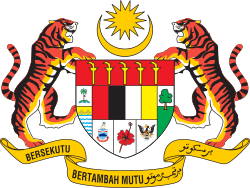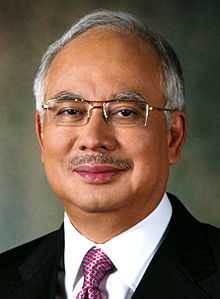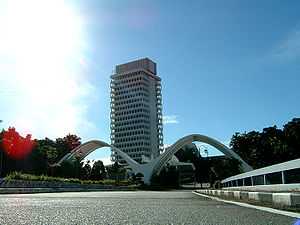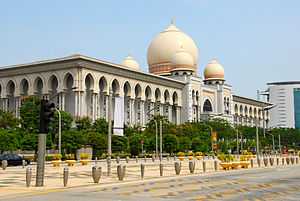Politics of Malaysia
 |
| This article is part of a series on the politics and government of Malaysia |
|
|
|
|
Politics portal |
The politics of Malaysia takes place in the framework of a federal representative democratic constitutional monarchy, in which the Yang di-Pertuan Agong is head of state and the Prime Minister of Malaysia is the head of government. Executive power is exercised by the federal government and the 13 state governments. Federal legislative power is vested in the federal parliament and the 13 state assemblies. The judiciary is independent of the executive and the legislature, though the executive maintains a certain level of influence in the appointment of judges to the courts.
The Constitution of Malaysia is codified and the system of government is based on the Westminster system. The hierarchy of authority in Malaysia, in accordance to the Federal Constitution, stipulates the three branches (administrative components) of the Malaysian government as consisting of the Executive, Judiciary and Legislative branch. Whereas, the Parliament consists of the Dewan Negara (Upper House / House of Senate) and Dewan Rakyat (Lower House / House of Representatives).[1]
Malaysia has had a multi-party system since the first direct election of the Federal Legislative Council of the Malaya in 1955 on a first-past-the-post basis. The ruling party since then had always been the Alliance Party (Malay: Parti Perikatan) coalition and from 1973 onwards, its successor, the Barisan Nasional (National Front) coalition.
The Barisan Nasional coalition currently consists of the United Malays National Organisation (UMNO), Malaysian Chinese Association (MCA), Malaysian Indian Congress (MIC) and 11 other political parties. The opposition is made up of the People's Justice Party (PKR), Democratic Action Party (DAP) and Pan-Malaysian Islamic Party (PAS) that together form the unofficial Pakatan Rakyat coalition, and some smaller parties that are independent of both coalitions.
Although Malaysian politics has been relatively stable, critics allege that "the government, ruling party, and administration are intertwined with few countervailing forces."[2] However, since the 8 March 2008 General Election, the media's coverage on the country's politics has noticeably increased.
Political conditions
Malaysia's predominant political party, the United Malays National Organisation (UMNO), has held power in the coalition known as the Barisan Nasional (formerly the Alliance) with other parties since Malaya's independence in 1957.[3] In 1973, an alliance of communally based parties was replaced with a broader coalition – the Barisan Nasional — composed of fourteen parties. Today the Barisan Nasional coalition has three prominent members – the UMNO, MCA (Malaysian Chinese Association) and MIC (Malaysian Indian Congress). The Prime Minister of Malaysia has always been from the UMNO.
In addition to the UMNO and other member parties of the Barisan Nasional, three main opposition parties (and several smaller parties) compete in national and state-level elections in Malaysia. The three most competitive opposition parties are the aforementioned People's Justice Party (Parti Keadilan Rakyat in Malay, shortened to PKR), Pan-Malaysian Islamic Party (Parti Islam se-Malaysia, or PAS) and the Democratic Action Party (DAP). The Islamic Party of Malaysia (PAS) promotes a more Islamist political agenda, the Democratic Action Party (DAP) a more democratic socialist economic policy, while the People's Justice Party puts strong emphasis on social justice and anti-corruption.[4]
The political process in Malaysia has generally been described as taking the form of "consociationalism" whereby "communal interests are resolved in the framework of a grand coalition". The executive branch is described as tending to dominate political activity, with the Prime Minister's office being in a position to preside "over an extensive and ever growing array of powers to take action against individuals or organisations," and "facilitate business opportunities". Critics of the ruling government generally agree that although authoritarianism in Malaysia preceded the administration of Mahathir bin Mohamad, it was he who "carried the process forward substantially". Legal scholars have suggested that the political "equation for religious and racial harmony" is rather fragile, and that this "fragility stems largely from the identification of religion with race coupled with the political primacy of the Malay people colliding with the aspiration of other races for complete equality."
During the terms of Dr. Mahathir Mohamad as the fourth Prime Minister of Malaysia, many constitutional amendments were made. For example, the Senate could only delay a bill from taking effect and the Monarch no longer had veto powers on proposed bills. Also, the 26 state senators were no longer the majority as another 44 senators were appointed by the King at the advice of the Prime Minister. The amendments also limited the powers of the judiciary to what parliament grants them.
In early September 1998, Prime Minister Mahathir bin Mohamad dismissed Deputy Prime Minister Anwar Ibrahim and accused Anwar of immoral and corrupt conduct. Anwar said his ousting was actually owed to political differences and led a series of demonstrations advocating political reforms. Later in September, Anwar was arrested, beaten while in prison (by among others, the chief of police at the time), and charged with corrupt practices, in both legal and moral contexts, charges including obstruction of justice and sodomy. In April 1999, he was convicted of four counts of corruption and sentenced to six years in prison. In August 2000, Anwar was convicted of one count of sodomy and sentenced to nine years to run consecutively after his earlier six-year sentence. Both trials were viewed by domestic and international observers as unfair. Anwar's conviction on sodomy has since been overturned, and having completed his six-year sentence for corruption, he has since been released from prison. In the November 1999 general election, the Barisan Nasional returned to power with three-fourths of the parliamentary seats, but UMNO's seats dropped from 94 to 72. The opposition, the Barisan Alternatif coalition, led by the Islamic Party of Malaysia (PAS), increased its seats to 42. PAS retained control of the state of Kelantan and won the additional state of Terengganu.

The current Prime Minister is Dato' Seri Mohd. Najib bin Tun Haji Abdul Razak. He took office following the retirement of Dato' Seri Abdullah Ahmad Badawi (colloquially known as "Pak Lah") on April 2009.[1]
In the March 2004 general election, Dato' Seri Abdullah Ahmad Badawi led Barisan Nasional to a landslide victory, in which Barisan Nasional recaptured the state of Terengganu. The coalition controlled 92% of the seats in Parliament. In 2005, Mahathir stated that "I believe that the country should have a strong government but not too strong. A two-thirds majority like I enjoyed when I was Prime Minister is sufficient but a 90% majority is too strong. ... We need an opposition to remind us if we are making mistakes. When you are not opposed you think everything you do is right."
The national media is largely controlled by the government and by political parties in the Barisan Nasional/National Front ruling coalition and the opposition has little access to the media. The print media is controlled by the Government through the requirement of obtaining annual publication licences under the Printing and Presses Act. In 2007, a government agency – the Malaysian Communications and Multimedia Commission – issued a directive to all private television and radio stations to refrain from broadcasting speeches made by opposition leaders.
The official state ideology is the Rukunegara, which has been described as encouraging "respect for a pluralistic, multireligious and multicultural society". However, political scientists have argued that the slogan of Bangsa, Agama, Negara (race, religion, nation) used by UMNO constitutes an unofficial ideology as well. Both ideologies have "generally been used to reinforce a conservative political ideology, one that is Malay-centred."
Executive power is vested in the cabinet led by the prime minister; the Malaysian constitution stipulates that the prime minister must be a member of the lower house of parliament who, in the opinion of the Yang di-Pertuan Agong, commands a majority in parliament. The cabinet is chosen from among members of both houses of Parliament and is responsible to that body.
In recent years, the opposition has been campaigning for freer and fairer elections within Malaysia. On 10 November 2007, a mass rally, called the 2007 Bersih Rally, took place in the Dataran Merdeka, Kuala Lumpur at 3 pm to demand for clean and fair elections. The gathering was organised by BERSIH, a coalition comprising political parties and civil society groups(NGOs), and drew supporters from all over the country.
On 11 November, the Malaysian government briefly detained de facto opposition leader Anwar Ibrahim on Tuesday and arrested a human rights lawyer and about a dozen opposition leaders, amid growing complaints that the government was cracking down on dissent. Dozens of policemen blocked the main entrance to the parliament building in Kuala Lumpur to foil an opposition-led rally. The rally was carried out along with the attempt to submit a protest note to Parliament over a government-backed plan to amend a law that would extend the tenure of the Election Commission chief, whom the opposition claims is biased.
The Malaysian government intensified efforts on 6 March 2008 to portray opposition figure Anwar Ibrahim as a political turncoat, days ahead of the Malaysian general election, 2008 on 8 March 2008 because he posed a legitimate threat to the ruling coalition.[5] Campaigning wrapped up 7 March 2008 for general elections that could see gains for Malaysia's opposition amid anger over race and religion among minority Chinese and Indians.[6] Malaysians voted 8 March 2008 in parliamentary elections.[6] Election results showed that the ruling government suffered a setback when it failed to obtain two-thirds majority in parliament, and five out of 12 state legislatures were won by the opposition parties.[7] Reasons for the setback of the ruling party, which has retained power since the nation declared independence in 1957, were rising inflation, crime and ethnic tensions.[8]
Monarch
The monarch of Malaysia is the Yang di-Pertuan Agong (YDPA), commonly referred to as the Supreme King of Malaysia. Malaysia is a constitutional elective monarchy, the Yang di-Pertuan Agong is selected for a five-year terms from among the nine Sultans of the Malay states. The other four states that do not have monarch kings, are ruled by governors.[9] The position has to date been, by informal agreement, based on systematic rotation between the nine sultans; the order was originally based on seniority.
According to the Federal Constitution of Malaysia, the YDPA is considered as the Supreme Head of the Federation (Article 32). As a constitutional head, the YDPA is to act on the advice of the Prime Minister (Article 40). The YDPA or monarch king basically has three broad power vested in him (Jeong, 2012):[1]
- The power to exercise based on the advice from the Prime Minister, the Cabinet, and the Conference of Rulers (Article 32, 38, 40)
- The power to exercise based on his discretionary power (without the consent or influence of any other authority)
- The power to pardon (granting of pardons), reprieves and respites, and/or of remitting, suspending or commuting sentences, under Clause (12) of Article 42.
The YDPA is also the Supreme Commander of the Armed Forces (i.e. Police, Army) in the Federation of Malaysia (Article 41). He is also the head of the Islamic faith in Malaysia.[10]
System of government
Malaysia is a federation of 13 states and 3 federal territories. The system of government in Malaysia is closely modelled on that of Westminster parliamentary system, a legacy of British colonial rule.[11] In practice however, more power is vested in the executive branch of government than in the legislative, and the judiciary has been weakened by sustained attacks by the government during the Mahathir era.[12][13][14] Parliamentary elections are held at least once every five years, usually concurrent with state elections for state assemblies except for Sabah (until 2004) and Sarawak.[15]
Branches of federal government
Legislative

Legislative power is divided between federal and state legislatures. The bicameral parliament consists of the lower house, the House of Representatives or Dewan Rakyat (literally the "Chamber of the People"); and the upper house, the Senate or Dewan Negara (literally the "Chamber of the Nation").[16][17][17] All seventy Senate members sit for three-year terms (to a maximum of two terms); twenty-six are elected by the thirteen state assemblies, and forty-four are appointed by the king based on the advice of the Prime Minister.[3] The 222 members of the Dewan Rakyat are elected from single-member districts by universal adult suffrage. Parliament has a maximum mandate of five years by law. The king may dissolve parliament at any time, and usually does so upon the advice of the Prime Minister. General elections must be held within sixty days of the dissolution of parliament. In practice, this has meant that elections have been held every three to five years at the discretion of the Prime Minister.
Legislative power is divided between federal and state legislatures. Malaysia has two sources of law. The national constitution, the nation's supreme law, can be amended by a two-thirds majority in parliament. (Since its formation, the BN has never lacked the necessary two-thirds until 8 March 2008's General Election) The second source of law is syariah (Islamic law), which applies only to Muslims. The federal government has little input into the administration of syariah; it falls to the states to implement Islamic law, and interpretations vary from state to state. The parliament follows a multi-party system and the governing body is elected through a first-past-the-post system.[3]
Executive
Executive power is vested in the cabinet led by the prime minister; the Malaysian constitution stipulates that the prime minister must be a member of the Lower House of parliament who, in the opinion of the Yang di-Pertuan Agong (YDPA), commands a majority in parliament.[18] The cabinet is chosen from among members of both houses of Parliament and is responsible to that body.[19][1]
The Executive branch of the government consists of the Prime Minister as the head of the government, followed by the various ministers of the Cabinet. It formulates various socio-economic policies and development plans, for the development of the country as a whole. The Executive has the power and authority to generate revenues through the collection of various taxes, levies, fines, summons, custom duties, and fees, to name some, from the general public.
Judicial

The judiciary is theoretically independent of the executive and the legislature,[20] although supporters of the government hold many judicial positions.[21] The highest court in the judicial system is the Federal Court, followed by the Court of Appeal, and two High Courts, one for Peninsular Malaysia, and one for East Malaysia. The subordinate courts in each of these jurisdictions include Sessions Courts, Magistrates' Courts, and Courts for Children. Malaysia also has a Special Court to hear cases brought by or against all Royalty.[22]
There is also a Special Court, established in 1993 to hear cases brought by or against Ruler. Before its establishment, Rulers were immune from any proceedings brought against them in their personal capacity.[23] Rulers include the Yang di-Pertuan Agong (the elected Monarch), and the heads of state of Malaysia's component states.
Separate from the civil courts are the Syariah Courts, which decide on cases which involve Malaysian Muslims.[24] These courts run parallel to the normal court system, and are undergoing reforms that include the first ever appointment of female judges.[25] Debate exists in Malaysia over whether the country should be secular or Islamic.[26] Some state governments controlled by the Pan-Malaysian Islamic Party, including that of Terengganu, have passed Islamic laws, but these have not gone into effect due to opposition from the federal government.[27]
Legal system
Malaysia's legal system is based on English Common Law,[3] alongside a Sharia court system for Malaysian Muslims. The Federal Court reviews decisions referred from the Court of Appeals; it has original jurisdiction in constitutional matters and in disputes between states or between the federal government and a state. Peninsular Malaysia and the East Malaysian states of Sabah and Sarawak each has a high court. The federal government has authority over external affairs, defence, internal security, justice (except civil law cases among Malays or other Muslims and other indigenous peoples, adjudicated under Islamic and traditional law), federal citizenship, finance, commerce, industry, communications, transportation, and other matters.
State powers and law enforcement
Due to the Internal Security Act (now abolished), the Interior Minister is able to arrest any Malaysian without trial. The government has effective control of all media, with media outlets only able to operate if licensed by the government.[21] Convictions cannot be challenged.[28]
There are 27,299 prisoners in Malaysia, a country with 581 thefts, 8 rapes, and 2 murders per 100,000 people. The Death penalty is in use, and mandatory for narcotics possession.[28]
State governments
Each state has a unicameral state legislative chamber (Malay: Dewan Undangan Negeri) whose members are elected from single-member constituencies. State governments are led by Chief Ministers[3] (Menteri Besar in Malay states or Ketua Menteri in states without hereditary rulers), who are state assembly members from the majority party in the Dewan Undangan Negeri. They advise their respective sultans or governors. In each of the states with a hereditary ruler, the Chief Minister is required to be an ethnic Malay, appointed by the Sultan upon the recommendation of the Prime Minister.[29] Parliamentary elections are held at least once every five years, with the last general election being in April 2013.[3] Registered voters of age 21 and above may vote for the members of the House of Representatives and, in most of the states, for the state legislative chamber. Voting is not mandatory.[30] Although Malaysia is a federal state, political scientists have suggested that its "federalism is highly centralised":
| “ | Our federalism gives the federal government not only the most legislative and executive powers but also the most important sources of revenue. State governments are excluded from the revenues of income tax, export, import and excise duties, and they are also largely restricted from borrowing internationally. They have to depend on revenue from forests, lands, mines, petroleum, the entertainment industry, and finally, transfer payments from the central government.[31] | ” |
Participation
Race plays a large role in Malaysian politics, and many Malaysian political parties are ethnically based.[3] The Government's New Economic Policy (NEP)[32] and the National Development Policy (NDP) which superseded it, were implemented to advance the standing of Bumiputera Malaysians. The policies provide preferential treatment to Malays over non-Malays in employment, education, scholarships, business, and access to cheaper housing and assisted savings. While improving in the economic position of Malays, it is a source of resentment amongst non-Malays.[33] Prime Minister Dato Sri Mohd Najib Tun Razak has claimed to attempt to close racial divides through the 1Malaysia initiative.[34]
The origin of race based politics can be traced back to independence of Malaysia from United Kingdom, who wanted all citizens of Malaysia to be equal upon independence, instead of dominance by Malays. This caused the political parties of the three major races at the time, the UMNO (representing Malays), the MCA (representing Chinese), and the MIC (representing Indians), to join and form the Alliance Party.[35]
Students are not allowed to be involved in politics, due to the University and University College Act.[21] A higher interest in the political process led to a slowdown in outbound corporate travel in anticipation of the general election in the first half of 2013, where many travellers postponed travel to ensure they had the chance to cast their votes.[36]
Foreign relations
Malaysia participates in international politics and engages in formal relationships with international bodies as well as with foreign states adopting various policies. Malaysia's participation in international politics also affects domestic politics for example the Israel–Malaysia relations.
References
- ↑ 1.0 1.1 1.2 1.3 Jeong Chun Hai @Ibrahim, & Nor Fadzlina Nawi. (2012). Principles of Public Administration: Malaysian Perspectives. Kuala Lumpur: Pearson Publishers. ISBN 978-967-349-233-6
- ↑ "Conclusion". In John Funston (Ed.), Government and Politics in Southeast Asia, p. 413. Singapore: Institute of Southeast Asian Studies. ISBN 1-84277-105-1.
- ↑ 3.0 3.1 3.2 3.3 3.4 3.5 3.6 "Malaysia". State.gov. 14 July 2010. Retrieved 14 September 2010.
- ↑ Pepinsky, Thomas (2009). Economic Crises and the Breakdown of Authoritarian Regimes: Indonesia and Malaysia in Comparative Perspective. Cambridge: Cambridge University Press. pp. 61–63. ISBN 978-0-521-74438-6.
- ↑ http://edition.cnn.com/2008/WORLD/asiapcf/03/06/malaysia.elections.ap/index.html
- ↑ 6.0 6.1 CNN http://edition.cnn.com/2008/WORLD/asiapcf/03/07/malay.elex.ap/index.html. Missing or empty
|title=(help) - ↑ "Election setback for Malaysia PM". BBC News. 8 March 2008.
- ↑ http://edition.cnn.com/2008/WORLD/asiapcf/03/09/malaysia.elections/index.html. Missing or empty
|title=(help) - ↑ Constitution of Malaysia:Article 32
- ↑ Article 3, of the Federal Constitution of Malaysia.
- ↑ "Malaysia Informatio". Fita.org. Retrieved 27 October 2010.
- ↑ Milne, Robert Stephen; Diane K Mauzy (1999). Malaysian Politics Under Mahathir. New York: Routledge. pp. 29–50. ISBN 978-0-415-17143-4.
- ↑ Salles Abas, Mohamed; K. Das (1989). May Day for Justice. Kuala Lumpur: Magnus Books. ISBN 983-9631-00-4.
- ↑ Robertson, G (1991). "Malaysia: Justice Hangs In The Balance". UBC Law Review (Vancouver: University of British Columbia) 25 (1).
- ↑ "Malaysia country brief". dfat.gov.au. October 2010. Retrieved 19 February 2011.
- ↑ Constitution of Malaysia:Article 44
- ↑ 17.0 17.1 Constitution of Malaysia:Article 45
- ↑ Constitution of Malaysia:Article 43-2
- ↑ Constitution of Malaysia:Article 43-1
- ↑ "The Malaysian Government System".
- ↑ 21.0 21.1 21.2 Halvorssen, Thor (19 July 2010). "Malaysia's Bridge is Falling Down". Huffington Post. Retrieved 6 November 2010.
- ↑ "Malaysian criminal court system". Association of Commonwealth Criminal Lawyers. Retrieved 15 December 2010.
- ↑ Constitution of Malaysia:Article 43-2, now amended.
- ↑ "Malaysia rejects Christian appeal". BBC News. 30 May 2007. Retrieved 27 September 2010.
- ↑ England, Vaudine (9 July 2010). "Malaysian groups welcome first Islamic women judges". Bbc.co.uk. Retrieved 27 September 2010.
- ↑ "Malaysia sharia court allows Muslim to renounce Islam". Japantoday.com. Retrieved 27 September 2010.
- ↑ "Malaysian state passes Islamic law". Simonbaker.me. 8 July 2002. Retrieved 27 September 2010.
- ↑ 28.0 28.1 http://dev.prenhall.com/divisions/hss/worldreference/MY/crime.html
- ↑ United Nations Centre for Human Settlements (1996). The management of secondary cities in southeast Asia. Nairobi: United Nations Centre for Human Settlements. p. 120. ISBN 92-1-131313-9.
- ↑ "Malaysia (Dewan Rakyat)". Inter-Parliamentary Union. 29 September 2008.
- ↑ Wong, Chin Huat (25 July 2007). "Weakened federalism in the new federation". The Sun.
- ↑ Jomo Kwame Sundaram, UNRISD (1 September 2004). "The New Economic Policy and Interethnic Relations in Malaysia". UNRISD. Retrieved 27 October 2010.
- ↑ Fernandez, Joe. "NEM cast in deviant Vision 2020, NEP moulds". Free Malaysia Today. Retrieved 21 June 2010.
- ↑ Najib, Tun Razak. "1 Malaysia". 1Malaysia.com.my. Retrieved 15 November 2010.
- ↑ Kamarudin, Raja Petra. "THE CORRIDORS OF POWER". Malaysia Today. Retrieved 15 November 2010.
- ↑ "Malaysians halt outbound MICE for elections". TTGmice. Retrieved 27 February 2013.
Books
- James Chin. Politics of Federal Intervention in Malaysia, with reference to Kelantan, Sarawak and Sabah, Journal of Commonwealth and Comparative Politics, Vol. 35, No 2 (July) 1997, pp 96–120
- Abdul Rashid Moten & Syed Serajul Islam. (2005). Introduction to Political Science. Singapore: Thomson Publication.
- Ahmad Ibrahim, Tan Sri Datuk Seri. (1992). The Malaysian Legal System. Kuala Lumpur: Dewan Bahasa & Pustaka.
- ILBS. (2007). Federal Constitution of Malaysia. Kuala Lumpur: International Law Book Services.
- Jeong Chun Hai @ Ibrahim & Nor Fadzlina Nawi. (2012). Principles of Public Administration: Malaysian Perspectives. Kuala Lumpur: Pearson Publishers.
- Jeong Chun Hai @ Ibrahim. (2007). Fundamental of Development Administration. Selangor: Scholar Press.
- Wan Arfah Hamzah & Ramy Bulan. (2003). The Malaysian Legal System. Kuala Lumpur: Penerbit Fajar Bakti.
| ||||||||||||||